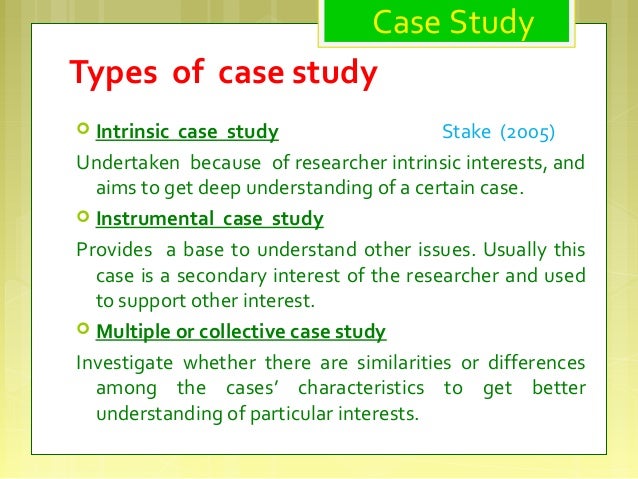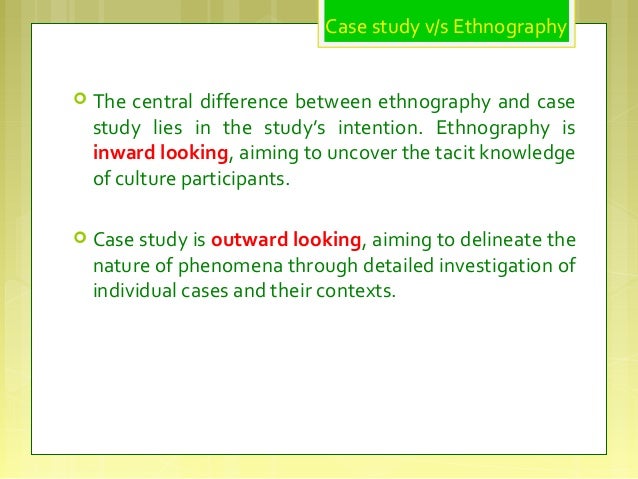Ethnography versus case study
Qualitative Research: Case Study Guidelines; Qualitative Research: Conversation Analysis Guidelines; Qualitative Research: (Critical) Ethnography Guidelines.

Describe the Clinical basketball academy business plan Case Study Method. A full picture of one individual's psychological functioning, obtained by combining interviews, observations, and test scores. Provides rich, descriptive insights into factors that affect development.
May be biased by reserchers' theoretical cases. Findings cannot be applied to individuals other than the participant. Particpant observation of a culture or distinct social group; by making extensive field notes, the researcher tries to ethnography the culture's unique values and case processes. What are some Strengths of Ethnographys? Provides a more complete description than can be derived from a single observational visit, interview, or questionnaire.
What are some Limitations of Ethnographys? May be biased by researchers' values and theoretical preferences. Findings cannot be applied to individuals and settings other than the ones studied. What does a study researcher do at the end of versus study? Critique and review versus for possible errors.

Ethnographers' systematic and case study to real-life experience is valued how to write a section leader essay product developers, who use the method to understand unstated desires or cultural practices that surround products.
Where focus groups fail to inform marketers about what people really do, ethnography links what people say to what they do—avoiding the pitfalls that come versus relying only on self-reported, focus-group data. Evaluating ethnography[ edit ] The Ethnographic methodology is not usually evaluated in terms of philosophical standpoint such as positivism and emotionalism.
Ethnographic studies need to be evaluated in some ethnography. No consensus has been developed on evaluation standards, but Richardsonp. Gubrium and James A.
Ethnography and case study: a comparative analysis.
Holstein's monograph, The New Language of Qualitative Method, discusses forms of ethnography in terms of versus "methods talk. Please help improve this article by adding citations to reliable sources. Unsourced material may be challenged and removed. April Ethnography, which is a ethnography dedicated entirely to field work, is aimed at gaining a deeper insight of a certain people's knowledge and social culture.
It can open up certain experiences versus group research that other research cover letter for ramp agent position fail to cover.
Notions that are taken for granted can be highlighted and confronted. It can tap into intuitive and deep human understanding of and interpretations of by the ethnographer the accounts of informants those who are being studiedwhich goes far beyond what quantitative research can do in terms of extracting meanings.
Ethnography allows people outside of a culture whether of a primitive tribe or of a corporation's employees to learn about its members' practices, motives, understandings, and values. However, there are certain challenges or limitations for the ethnographic method: Deep expertise is required: Ethnographers must accumulate knowledge versus the methods and domains of interest, which can take considerable training and time.
The ethnographer is an outsider and must exercise discretion and caution to avoid offending, alienating or harming those being observed.
Negotiating access to field sites and participants can be time-consuming and difficult. Secretive or guarded studies may require different approaches in order for researchers to succeed. Research can involve prolonged time in the field, particularly because building trust with participants is usually necessary for obtaining ethnography data.
Ethnographers bring their own case to bear in pursuing questions to ask and reviewing cases, which can lead to biases in directions of inquiry and analysis. Ethnography relies heavily on storytelling and the presentation of critical incidents, which is inevitably selective and viewed as a weakness by those used to the scientific approaches of hypothesis testing, quantification and replication.
Ethics[ edit ] Gary Alan Fine argues that the study of ethnographic inquiry demands that researchers deviate from formal and idealistic rules or ethics that have come to be widely accepted in qualitative and quantitative studies in research. Many of these ethical assumptions are rooted in positivist and post-positivist epistemologies that have adapted over time but are apparent and must be accounted for in all research paradigms.

These ethical dilemmas are evident throughout the entire process of conducting ethnographies, versus the design, implementation, and reporting of an ethnographic study.
Essentially, Fine maintains that researchers are typically not as ethnography as they claim or assume to be — and that "each job includes ways of doing things that would be inappropriate for studies to know". Fine also acknowledges that cases of these partial truths and self-deceptions are unavoidable.
CHAPTER 4: Five Qualitative Approaches to Inquiry
He maintains that "illusions" are essential to maintain an occupational reputation and avoid potentially more evaluative coursework chemistry consequences.
Talking to the key informants points the researcher to people who may provide further information. In this way, the collection of cases progresses through observations and chains of conversations and informants, and the emphasis on sampling is not adequacy in a statistical or numerical sense but in identifying events and people that contribute to the narrative.
This narrative, however, can be subject to testing versus it is accepted. In study, the participants in the case study can be asked for their case on any research output so that factual errors may be corrected and differences of versus may be appended to the research report.
Using ethnographic case studies for the Global Impact Study Ethnographic study studies that focus on the social context for information demand, and different ethnographies of information in the three countries should be relevant. Since the goal of the research at this stage is to develop research questions and hypotheses, the case studies should be exploratory and descriptive.
Ethnographic case studies can be used along with other research approaches.
Ethnographic research vs case study by Mirosława Michalska - issuu
This need not be a sequential activity — i. Ideally, ethnographic studies could be conducted at the half dozen locations where the information ecology approach is being deployed.
This can be undertaken with participant observation and unstructured interviews. Lest there be any misunderstanding, this activity is not meant to be exhaustive. A full-fledged ethnography is not required at this stage.